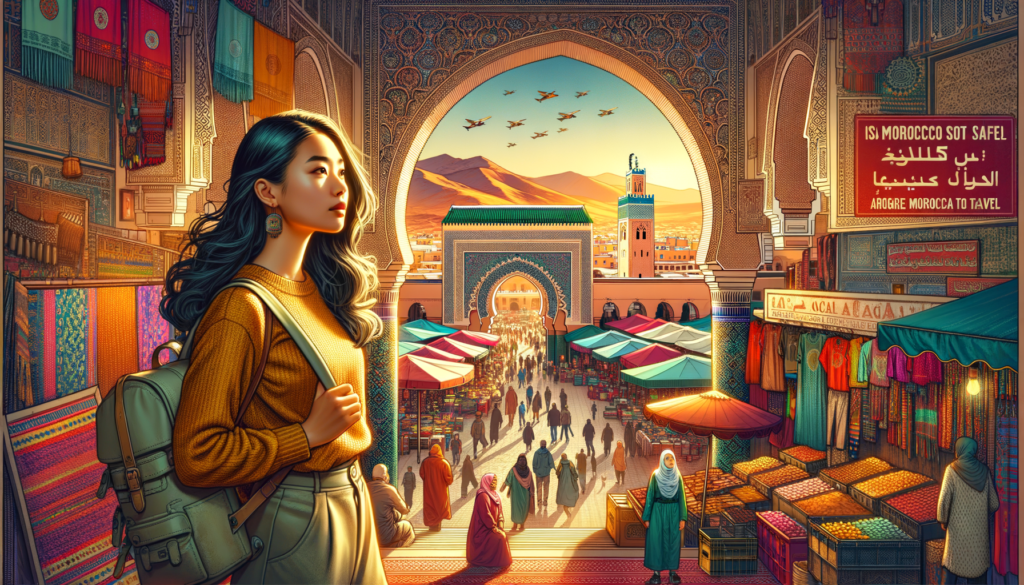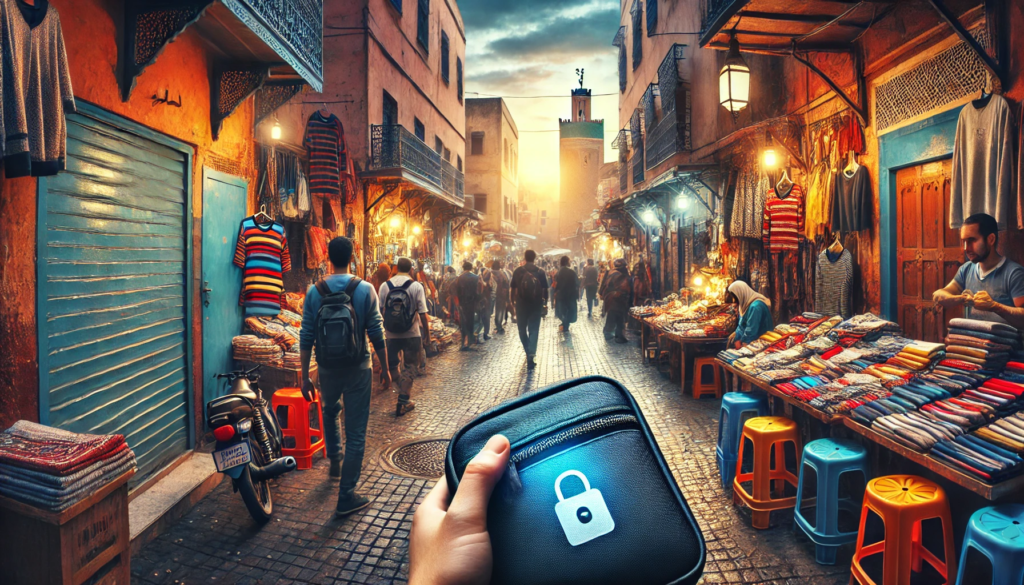
Is it safe to go to Morocco right now? This question often arises for travelers captivated by the country’s contrasts—a mesmerizing blend of ancient traditions and modern allure. From its bustling souks and timeless medinas to the serene Saharan dunes and lush High Atlas Mountains, this North African gem has long been a beacon for world travelers. Its vibrant cities, like Marrakech and Fes, pulse with life, offering a sensory explosion of colors, scents, and sounds. Whether you’re chasing adventure, history, or relaxation, Morocco’s diverse charm is hard to resist.
However, as with any international travel, exploring Morocco safely requires awareness and preparation. While it is generally seen as a welcoming destination, travelers should take certain precautions to ensure peace of mind and enjoy their trip to the fullest. The aim of this guide is to provide a comprehensive overview of Morocco’s safety profile, practical advice for staying secure, and tips for navigating the country smartly.
Morocco’s Safety Landscape
Overview of Morocco’s Stability
Morocco stands out in the region for its political stability, supported by strong governance and strategic international alliances. The kingdom enjoys a relatively calm environment compared to some of its neighbors, earning it a reputation as a safe and accessible gateway to Africa. Visitors will find locals to be warm and hospitable, reflecting Morocco’s deep-rooted tradition of generosity toward travelers.
Quoting the Experts
Author and Morocco expert Lucas Peters once noted that the country is “marked by low gun violence and mostly manageable safety concerns.” This sentiment is shared by many seasoned travelers who recognize that most risks faced by tourists in Morocco stem from common sense missteps, such as careless driving or disregarding basic precautions.
Understanding the Risks
It’s important to put Morocco’s safety considerations into perspective: Most of the challenges you’ll encounter are not related to serious organized crime or large-scale threats, but rather everyday mishaps. Reckless driving, especially in urban areas, ranks as one of the leading concerns. Additionally, taking simple actions—like keeping valuables out of sight or avoiding risky areas at night—can significantly reduce your chances of encountering trouble.
U.S. Travel Advisories and Terrorism Risks

Understanding Morocco’s Official Travel Advisories
The U.S. State Department currently assigns Morocco a “Level 2” safety rating, advising travelers to exercise increased caution. This designation is relatively common for international destinations and reflects Morocco’s overall stability as well as some potential risks. A “Level 2” rating essentially means travelers should remain vigilant but not alarmed, as the risks are manageable with proper precautions.
The Realities of Terrorism Risks
While terrorism risks exist in nearly all parts of the world, Morocco’s government takes extensive measures to maintain security, particularly in its heavily visited cities and tourist sites. That said, international advisories urge caution against potential terrorist targets such as:
- Tourist attractions
- Public areas, like marketplaces or plazas
- Transportation hubs, including airports and stations
The last significant terrorism-related incident in Morocco was the 2011 Marrakech bombing, demonstrating that high-profile attacks remain rare. Vigorous counterterrorism efforts paired with Morocco’s cooperative relationship with international law enforcement have significantly minimized occurrences.
Staying Informed
Travelers are encouraged to stay informed on current security updates through platforms like the U.S. State Department’s travel advisories or embassy notifications. Understanding your surroundings and recognizing potential threats can go a long way in ensuring personal safety during your time in Morocco.
Common Safety Concerns
Petty Crime: Pickpocketing and Bag Snatching
While violent crime is not a significant issue in Morocco, petty crimes like pickpocketing and bag snatching can occur, particularly in bustling urban areas such as Tangier, Casablanca, and Marrakech. Travelers should take the following precautions to reduce their risk:
- Keep valuables secured and out of sight, especially in crowded areas or public transportation.
- Use anti-theft bags and avoid walking alone in poorly lit streets at night.
- Be cautious of overly friendly strangers offering unsolicited advice or assistance.
Transportation Safety
Reliable transportation options include intercity buses like Supratours and CTM, which offer safe, well-maintained services for longer distances. Taxis are generally a safe choice within urban areas, though it’s recommended to use them during the daytime and agree on a fare beforehand if the meter is not in use. However, avoid overcrowded city buses which can increase exposure to pickpocketing and discomfort.
Areas to Avoid
- Western Sahara: This region is associated with sporadic terrorism threats and unexploded landmines.
- Algerian Border: Heavily militarized with restricted access and some political tension.
- Rif Mountains: Known for occasional security concerns. Research specific travel destinations if visiting this area.
General Precautions and Traveler Tips
Stay Informed
One of the most critical aspects of safe travel is staying informed. Regularly check local news updates, weather forecasts, and travel advisories from your home country. Knowing about any current events or changes in security conditions can help you avoid unexpected risks and adjust your plans accordingly.
Respect Local Customs
Morocco is deeply rooted in Islamic culture, so being respectful of local traditions and practices is essential. Dress modestly, especially when visiting religious sites, and remember to avoid offensive gestures or behavior that might breach cultural norms. As part of local custom, avoid eating with your left hand, as it’s considered impolite.
Health Precautions
Travelers should stick to bottled water and well-reviewed restaurant options to avoid foodborne illnesses. Carry Travel insurance , including medical evacuation coverage, as healthcare access in rural areas may be limited.
Conclusion
Morocco is a fascinating and welcoming destination for travelers willing to take common-sense precautions. By staying informed, respecting local traditions, and following recommended safety tips, you can confidently explore Morocco’s vibrant cities, breathtaking landscapes, and rich heritage. Travel smart, remain aware of your surroundings, and let Morocco’s beauty and hospitality leave you with unforgettable memories.
Frequently Asked Questions: Traveling to Morocco
Is Morocco a safe country to visit?
Morocco is generally considered a safe destination for travelers. It has a stable government and strong international alliances with countries like the U.S., France, and Spain, which contribute to its safety profile. While serious crimes against tourists are rare, petty theft and harassment can occur. Being informed and cautious can significantly enhance your travel experience.
What are the travel advisory levels for Morocco?
The U.S. State Department categorizes Morocco as a ‘Level 2’ destination, meaning travelers should ‘exercise increased caution.’ This rating considers risks such as terrorism and petty crime. Major incidents are infrequent, with the last significant terrorist event being the 2011 bombing in Marrakech.
What safety concerns should travelers be aware of?
Travelers should be cautious of the following:
Petty crime: Pickpocketing and bag snatching are common, especially in cities like Tangier and Casablanca.
Transportation safety: City buses are not recommended, while intercity buses like Supratours and CTM are preferred. Taxis are generally safe during the day but require caution at night. Driving in Morocco can also be challenging due to poor road markings and local driving habits.
Are there areas in Morocco that travelers should avoid?
Yes, certain areas are best avoided:
Western Sahara: Due to terrorism threats and unexploded landmines.
Algerian border: Travel within 20 km of the Algerian border is not recommended due to military presence and instability.
Rif Mountains: This area is considered to have elevated risks from security concerns.
What precautions should travelers take while in Morocco?
To ensure safety, travelers should:
- Stay updated on local conditions and global news.
- Respect local customs, such as refraining from eating with your left hand in Arabic and Islamic culture.
- Secure your valuables, avoid displaying wealth, and steer clear of poorly lit areas, especially at night.
- Only drink bottled water and avoid consuming street food to minimize the risk of illness.
What can I do to prepare for emergencies during my trip?
Register your trip with the U.S. embassy in Morocco to receive updates and assistance if needed. Additionally, consider having medical evacuation and repatriation coverage, as medical facilities are better distributed in urban areas than in rural regions.
Is the healthcare system in Morocco reliable?
Morocco’s healthcare system is functional but unevenly distributed. Major cities have better medical facilities, while rural areas may have limited options. Carry health insurance that includes emergency evacuation to access international-standard care if required.
How can I avoid petty crime in Morocco?
To prevent becoming a victim of petty crimes such as pickpocketing and bag snatching:
- Keep your valuables out of sight and secure.
- Avoid crowded areas where pickpocketers are more active.
- Be cautious in known hotspots for crime, such as Tangier and Casablanca.
What local customs should I be mindful of?
Morocco is a culturally rich country with strong Islamic and Arabic traditions. Some cultural practices to respect include dressing modestly, refraining from taking photos of people without permission, and avoiding left-handed gestures like eating with your left hand.
Is Morocco safe for solo travelers?
Yes, Morocco can be safe for solo travelers if they take the necessary precautions, such as staying in populated areas, avoiding poorly lit streets at night, and respecting cultural norms. Women traveling alone may encounter unwanted attention but can manage it by dressing modestly and asserting boundaries.
